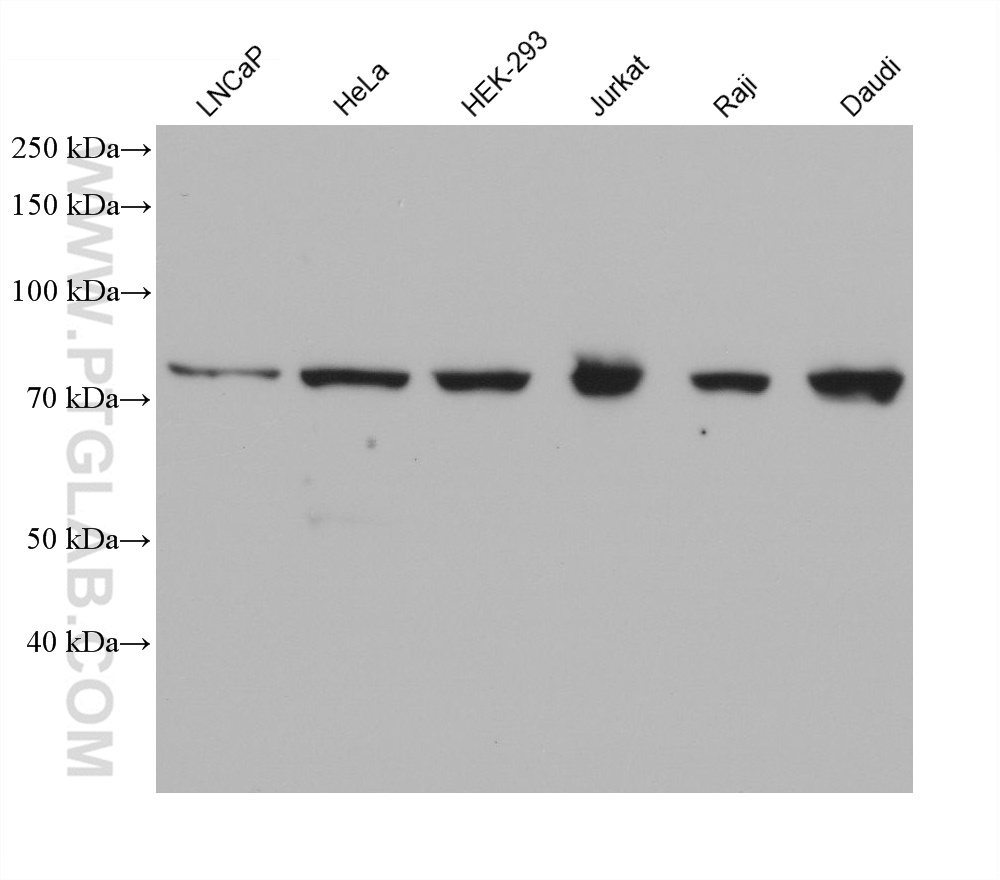验证数据展示
经过测试的应用
| Positive WB detected in | LNCaP cells, HeLa cells, HEK-293 cells, Jurkat cells, Raji cells, Daudi cells |
Planning an IHC experiment? We recommend our IHCeasy RAD17 Ready-To-Use IHC Kit. RAD17 primary antibody included.
推荐稀释比
| 应用 | 推荐稀释比 |
|---|---|
| Western Blot (WB) | WB : 1:2000-1:10000 |
| It is recommended that this reagent should be titrated in each testing system to obtain optimal results. | |
| Sample-dependent, Check data in validation data gallery. | |
产品信息
68539-1-Ig targets RAD17 in WB, ELISA applications and shows reactivity with Human samples.
| 经测试应用 | WB, ELISA Application Description |
| 经测试反应性 | Human |
| 免疫原 | RAD17 fusion protein Ag4348 种属同源性预测 |
| 宿主/亚型 | Mouse / IgG1 |
| 抗体类别 | Monoclonal |
| 产品类型 | Antibody |
| 全称 | RAD17 homolog (S. pombe) |
| 别名 | CCYC, FLJ41520, HRAD17, R24L, RAD17, RAD17 homolog (S. pombe), RAD17SP, RAD24, RF C/activator 1 homolog |
| 计算分子量 | 681 aa, 71 kDa |
| 观测分子量 | 70-80 kDa |
| GenBank蛋白编号 | BC032304 |
| 基因名称 | RAD17 |
| Gene ID (NCBI) | 5884 |
| RRID | AB_3085247 |
| 偶联类型 | Unconjugated |
| 形式 | Liquid |
| 纯化方式 | Protein G purification |
| UNIPROT ID | O75943 |
| 储存缓冲液 | PBS with 0.02% sodium azide and 50% glycerol , pH 7.3 |
| 储存条件 | Store at -20°C. Stable for one year after shipment. Aliquoting is unnecessary for -20oC storage. |
背景介绍
Rad17, a component of the checkpoint clamp loader complex (RAD17/RFC), was originally initially identified as a DNA damage checkpoint protein. Rad17 participates in cell cycle control and DNA damage repair. Rad17 phosphorylation by ATR (ataxia telangiectasia mutated and Rad3-related) kinase is indispensable for the recruitment of Claspin and the activation of Chk1 in response to genotoxic stress.
实验方案
| Product Specific Protocols | |
|---|---|
| WB protocol for RAD17 antibody 68539-1-Ig | Download protocol |
| Standard Protocols | |
|---|---|
| Click here to view our Standard Protocols |
